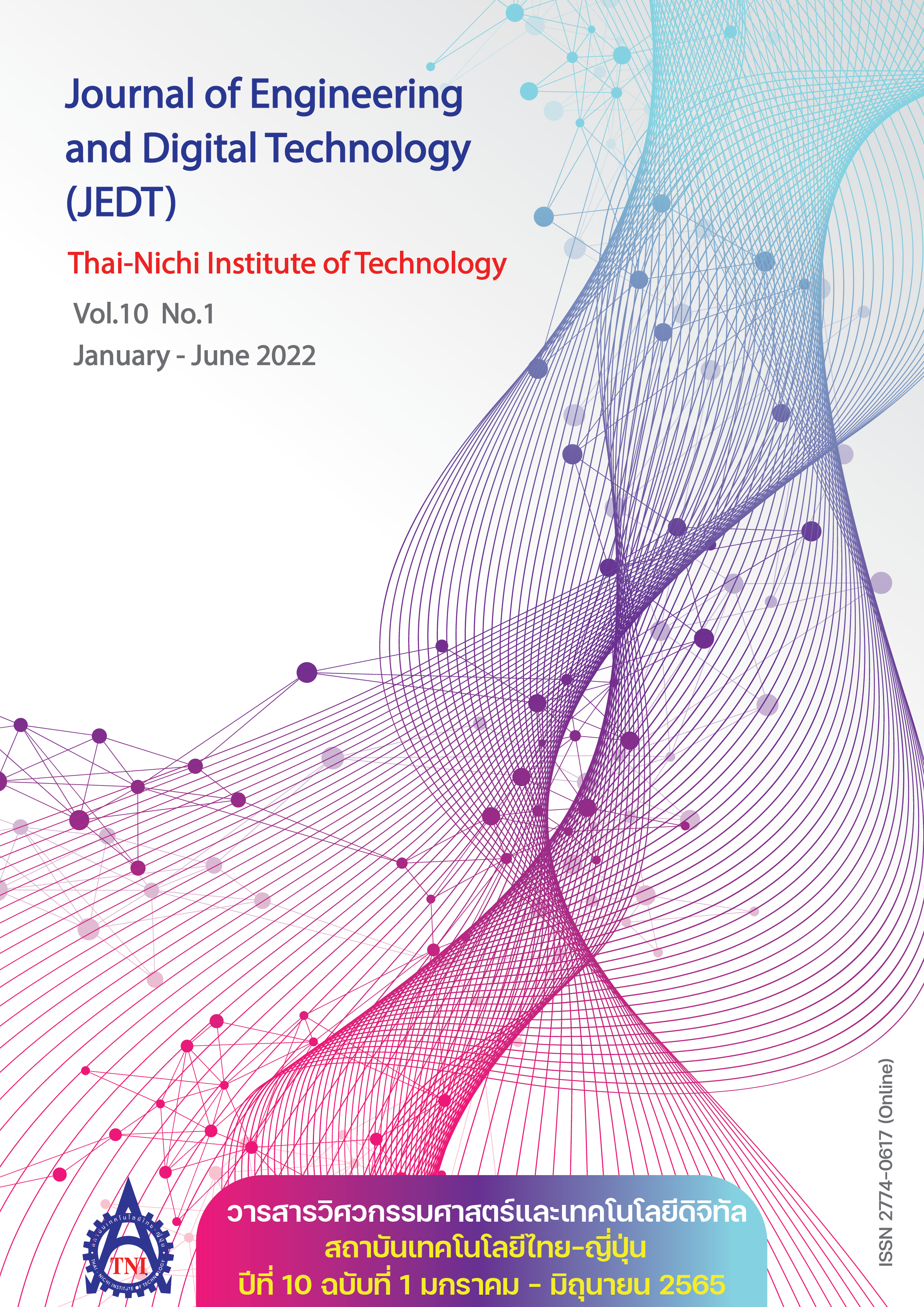ตัวแบบการวิเคราะห์ความรู้สึกทางอารมณ์ สำหรับจำแนกประเภทบทความแนะนำสินค้าออนไลน์
Main Article Content
บทคัดย่อ
การตัดสินใจซื้อสินค้าและบริการออนไลน์ ผู้บริโภคส่วนใหญ่จะทำการสืบค้นข้อมูลเกี่ยวกับสินค้าและบริการรวมทั้งพิจารณาจากการแสดงความคิดเห็น (Comments) และบทวิจารณ์ (Reviews) จากผู้ที่เคยซื้อสินค้าไปแล้ว เพื่อเป็นแนวทางในการตัดสินใจเลือกซื้อ อย่างไรก็ตาม ข้อมูลการแสดงความคิดเห็นและบทวิจารณ์ในปัจจุบันนั้นมีปริมาณมหาศาลและเกิดขึ้นใหม่อยู่ตลอดเวลา ซึ่งทำให้ผู้บริโภคต้องเสียเวลาในการวิเคราะห์ข้อดีข้อเสียของผลิตภัณฑ์เหล่านี้ด้วยตนเองเพื่อใช้ในการตัดสินใจเลือกซื้อสินค้าและบริการ ซึ่งถ้าหากมีการสร้างตัวแบบเพื่อแจ้งให้ผู้ใช้งานทราบถึงการวิเคราะห์ความรู้สึกได้จะช่วยให้ผู้ซื้อตัดสินใจได้รวดเร็วมากยิ่งขึ้น ดังนั้นงานวิจัยนี้มีวัตถุประสงค์เพื่อนำเสนอ ตัวแบบการวิเคราะห์ความรู้สึกทางอารมณ์สำหรับจำแนกประเภทบทความแนะนำสินค้าออนไลน์โดยใช้เทคนิคส่วนการเรียนรู้ของเครื่อง (Machine Learning) ร่วมกับเทคนิคการตัดคำ (Word Tokenization) และการสร้างคลังคำศัพท์ (Bag of Words) จากนั้นนำเข้ากระบวนการจำแนกประเภทผลการวิเคราะห์ 4 เทคนิค ได้แก่ LSTM, SGD, Logistic Regression และ Support Vector Machines ในการสร้างตัวแบบมีกระบวนการทดลอง 5 ขั้นตอน ได้แก่ 1) การเตรียมข้อมูล 2) การตัดคำ 3) การฝึกอบรมข้อมูล 4) ขั้นตอนการแยกประเภท และ 5) การประเมินตัวแบบ ทำการทดลองโดยใช้ข้อมูลตัวอย่างการแสดงความคิดเห็นต่อสินค้าและบริการออนไลน์ภาษาไทย จำนวน 12,900 ข้อมูล ใช้เป็นข้อมูลในการสร้างตัวแบบ เพื่อช่วยให้ผู้บริโภคใช้ในการตัดสินใจซื้อสินค้าและบริการ และช่วยให้ผู้ประกอบการมีข้อมูลสำหรับการพัฒนาสินค้าและบริการต่อไปในอนาคต จากผลการทดลองสร้างตัวแบบการวิเคราะห์ระดับความรู้สึกทางอารมณ์ 3 ระดับ คือ ความรู้สึกเชิงบวก (Positive) เป็นกลาง (Neutral) และเชิงลบ (Negative) โดยแต่ละตัวแบบให้ค่าความถูกต้องในการทำนายผล ดังนี้ LSTM 81.27%, Logistic Regression 69%, SGD 66%, และ Support Vector Machines 65% สรุปได้ว่าการสร้างตัวแบบโดยใช้เทคนิคการจำแนกประเภทแบบ LSTM ให้คะแนนความถูกต้องสูงที่สุดในการทำนายผลด้วยการเรียนรู้เชิงลึก จึงเหมาะสมแก่การนำไปใช้สร้างตัวแบบในการวิเคราะห์ระดับความรู้สึกกับข้อความที่เป็นภาษาไทยโดยพิจารณาจากค่า F1
Article Details

อนุญาตภายใต้เงื่อนไข Creative Commons Attribution-NonCommercial-NoDerivatives 4.0 International License.
นโยบายการรับบทความ
กองบรรณาธิการวารสารสถาบันเทคโนโลยีไทย-ญี่ปุ่น มีความยินดีรับบทความจากอาจารย์ประจำ และผู้ทรงคุณวุฒิในสาขาวิศวกรรมศาสตร์และเทคโนโลยี ที่เขียนเป็นภาษาไทยหรือภาษาอังกฤษ ซึ่งผลงานวิชาการที่ส่งมาขอตีพิมพ์ต้องไม่เคยเผยแพร่ในสิ่งพิมพ์อื่นใดมาก่อน และต้องไม่อยู่ในระหว่างการพิจารณาของวารสารอื่นที่นำส่ง ดังนั้นผู้สนใจที่จะร่วมเผยแพร่ผลงานและความรู้ที่ศึกษามาสามารถนำส่งบทความได้ที่กองบรรณาธิการเพื่อเสนอต่อคณะกรรมการกลั่นกรองบทความพิจารณาจัดพิมพ์ในวารสารต่อไป ทั้งนี้บทความที่สามารถเผยแพร่ได้ประกอบด้วยบทความวิจัย ผู้สนใจสามารถศึกษาและจัดเตรียมบทความจากคำแนะนำสำหรับผู้เขียนบทความ
การละเมิดลิขสิทธิ์ถือเป็นความรับผิดชอบของผู้ส่งบทความโดยตรง บทความที่ได้รับการตีพิมพ์ต้องผ่านการพิจารณากลั่นกรองคุณภาพจากผู้ทรงคุณวุฒิและได้รับความเห็นชอบจากกองบรรณาธิการ
ข้อความที่ปรากฏภายในบทความของแต่ละบทความที่ตีพิมพ์ในวารสารวิชาการเล่มนี้ เป็น ความคิดเห็นส่วนตัวของผู้เขียนแต่ละท่าน ไม่เกี่ยวข้องกับสถาบันเทคโนโลยีไทย-ญี่ปุ่น และคณาจารย์ท่านอื่น ๆ ในสถาบัน แต่อย่างใด ความรับผิดชอบด้านเนื้อหาและการตรวจร่างบทความแต่ละบทความเป็นของผู้เขียนแต่ละท่าน หากมีความผิดพลาดใด ๆ ผู้เขียนแต่ละท่านจะต้องรับผิดชอบบทความของตนเองแต่ผู้เดียว
กองบรรณาธิการขอสงวนสิทธิ์มิให้นำเนื้อหา ทัศนะ หรือข้อคิดเห็นใด ๆ ของบทความในวารสารสถาบันเทคโนโลยีไทย-ญี่ปุ่น ไปเผยแพร่ก่อนได้รับอนุญาตจากผู้นิพนธ์ อย่างเป็นลายลักษณ์อักษร ผลงานที่ได้รับการตีพิมพ์ถือเป็นลิขสิทธิ์ของวารสารสถาบันเทคโนโลยีไทย-ญี่ปุ่น
ผู้ประสงค์จะส่งบทความเพื่อตีพิมพ์ในวารสารวิชาการ สถาบันเทคโนโลยีไทย-ญี่ปุ่น สามารถส่ง Online ที่ https://www.tci-thaijo.org/index.php/TNIJournal/ โปรดสมัครสมาชิก (Register) โดยกรอกรายละเอียดให้ครบถ้วนหากต้องการสอบถามข้อมูลเพิ่มเติมที่
- กองบรรณาธิการ วารสารสถาบันเทคโนโลยีไทย-ญี่ปุ่น
- ฝ่ายวิจัยและนวัตกรรม สถาบันเทคโนโลยีไทย-ญี่ปุ่น
เลขที่ 1771/1 สถาบันเทคโนโลยีไทย-ญี่ปุ่น ซอยพัฒนาการ 37-39 ถนนพัฒนาการ แขวงสวนหลวง เขตสวนหลวง กรุงเทพมหานคร 10250 ติดต่อกับคุณพิมพ์รต พิพัฒนกุล (02) 763-2752 , คุณจุฑามาศ ประสพสันติ์ (02) 763-2600 Ext. 2402 Fax. (02) 763-2754 หรือ E-mail: JEDT@tni.ac.th
เอกสารอ้างอิง
P. Bowornlertsutee and W. Paireekreng, “The model of sentiment analysis for online shopping review using false detection technique,” (in Thai), in Proc. 14th Nat. Conf. Digit. Technol. Sustain. Wellbeing and Smart Soc., Bangkok, Thailand, Jun. 21, 2019, pp. 477–486.
P. Laowsungsuk, A. Jinda, and S. Sitthisarn, “Sentiment analysis of restaurant reviews on review web sites,” (in Thai), Thaksin Univ. J., vol. 20, no. 1, pp. 39–47, 2017.
M. Masdisornchote, “Constructing Thai opinion mining,” (in Thai), J. Sripatum Rev. Sci. Technol., vol. 6, no. 1, pp.120–128, 2014.
P. Kasemmetheekarun, P. Meesut, and S. Nuanmeesri, “Sentiment analysis system of Thai video on social media using support vector machine,” (in Thai), CRMA J., vol. 14, no. 1, pp. 21–33, 2016.
B. Chiraratanasopha, “Sentimental analysis and keyword extraction from Thai users of Facebook in COVID-19 period,” Prog. Appl. Sci. Technol., vol. 11, no. 1, pp. 66–72, 2021.
P. Bowornlertsutee and W. Paireekreng, “Thai sentiment analysis techniques for online customer reviews,” (in Thai), RMUTSV Res. J., vol. 14, no. 3, 2022, Art. no. 245470.
M. Manhem, S. Dolah, S. Chunkaew, and S. Mak-on, “Model for the classification of feelings of reviews using techniques decision tree case studies hotel reservation web site,” (in Thai), J. Sci. Technol. Songkhla Rajabhat Univ., vol. 1, no. 2, pp. 69–79, 2020.
S. Srisawakarn and S. Srisuay, “Sentiment analysis opinion mining using text extraction,” (in Thai), J. Educational Technol. Commun. Fac. Educ. Mahasarakham Univ., vol. 6, no. 2, pp. 95–104, 2020.
X. Fan, X. Li, F. Du, X. Li, and M. Wei, “Apply word vectors for sentiment analysis of APP reviews,” in Proc. 3rd Int. Conf. Syst. and Inform. (ICSAI), Shanghai, China, Nov. 2016, pp. 1062–1066, doi: 10.1109/ICSAI.2016.7811108.
T. Chumwatana, “Using sentiment analysis technique for analyzing Thai customer satisfaction from social media,” in Proc. 5th Int. Conf. Comput. and Inform., Istanbul, Turkey, Aug. 2015, pp. 659–664.
N. Sornjapo, “Thai text automatic clustering model using machine learning by unsupervised learning with natural language processing,” (in Thai), Sripatum Chonburi J., vol. 14, no. 4, pp. 95–106, 2018.
C. Haruechaiyasak, A. Kongthon, P. Palingoon, and K. Trakultaweekoon, “S-Sense: A sentiment analysis framework for social media monitoring applications,” Inf. Technol. J., vol. 14, no. 1, pp. 11–22, 2018.
I. Lorattanachaiyong, “Generating Thai sentiment lexicon from online reviews,” M.A. thesis, Dept. Arts, Chulalongkorn Univ., Bangkok, Thailand, 2017.
P. Promla and C. Sanrach, “The comparison of efficiency on the analysis of satisfaction on teaching performance using sentiment analysis by ensemble technique,” KKU Res. J. (Graduate Studies), vol. 20, no. 4, pp. 104–149, 2020.
W. Fongngen and S. Pethan, “Sentiment analysis opinion mining from Facebook comments using data mining technique,” (in Thai), J. Ind. Technol. Ubon Ratchathani Rajabhat Univ., vol. 11, no. 1, pp. 121–132, 2021.
O. Pravatborisut, Python for data science data visualization and machine learning. Bangkok, Thailand: Provision (in Thai), 2021.
S. Hiriyannaiah, S. G. Matt, and S. K. GopalaIyengar, “A hybrid model using MaLSTM based on recurrent neural networks with support vector machines for sentiment analysis,” Eng. Appl. Sci. Res., vol. 47, no. 3, pp. 232–240, 2020.
S. Diab, “Optimizing stochastic gradient descent in text classification base on fine-tuning hyper-parameters approach,” Int. J. Comput. Sci. Inf. Secur., vol. 16, no. 12, pp. 155–160, 2018.
X. Xie, K. Neelora, and S. Laohakiat, “Sentimental analysis using Twitter data,” M.S. thesis, Dept. Comput. Sci., Srinakharinwirot Univ., Bangkok, Thailand, 2018.


